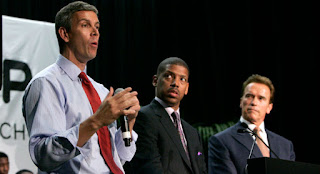“I’m not sure public schools understand that we’re their customer—that we, the business community, are your customer,” said Tillerson during the panel discussion. “What they don’t understand is they are producing a product at the end of that high school graduation.” -- Fortune Magazine
New York State's Attorney General Eric Schneiderman is currently investigating Exxon to determine whether the corporation lied to the public about climate change, or to investors about the risks to the oil industry.
Leading the counter-attack and defending public education is veteran educator and director of the Network for Public Education, Carol Burris.
In a sharply-worded letter to Tillerson, Burris writes:
Yet somehow, Tillerson and Exxon still feel qualified and on moral enough ground to bash public schools and debase students as a way of promoting corporate-style reform, and particularly, Common Core and its testing regimen.
To Tillerson and several other of the wealthiest corporate execs including Bill Gates, public schools are little more than a publicly-financed training ground for the corporate labor pool. Putting schools at the service of the global corporate race to the top, has also been the mantra of Arne Duncan and the D.O.E. for the past seven years. To them, schools are a business, preparing and marketing students to the corporations -- and, according to Tillerson, turning out an inferior product. This, even though Exxon and the 12 other giant petro-corps contribute little in the way of taxes to support public ed.
Exxon gets $600 million in annual federal tax breaks. Every effort to eliminate these breaks—recently pushed by Sens. Bernie Sanders of Vermont and Robert Menendez of New Jersey—can't get through Congress. Surprise, surprise. Exxon pays an effective corporate income tax rate of about 13 percent, just over a third of the nominal rate of 35 percent. (Daily Kos)Tillerson's remarks have drawn a sharp rebuke from parents and educators. Ed activists are joining environmentalists in calling for a boycott of Exxon products. They make the point that the job of public schools is not to supply a workforce for Big Business, but rather to educate young people to participate fully in American democratic society.
 |
| Effects from 1989 Exxon Valdez oil spill still being felt. |
In a sharply-worded letter to Tillerson, Burris writes:
Please leave our children alone. We do not need you to develop them as products. They are neither kerogen nor shale.
Your Dickensian thinking has been “outed” and this holiday season, you are as welcome as the ghost of Christmas past. The common-folk for whom the Core you adore was designed, do not like it—only 24 percent of public school parents want it used in their school. And they certainly do not like to hear their children referred to as “defective products.” Mr. Tillerson, you have made the mommies and daddies mad.
I understand their reaction must confound you. In a world in which your corporation has been declared a person, one might mistake human children for products to consume.
When we humanize the inanimate, it is easy for the humanity of the animate to slip away.
But let me make this clear — our children are not products for your purchase. You, and the captains of industry (or whatever you call yourselves this century), are not “the customers.” School is not a training camp to work on oilrigs, to pump gas or design lubricants. There is just enough democracy left to make students know they have choices, and more than enough parental commonsense left to know that community control of schools is slipping away.
We are so sorry to disappoint.
The story line is not as simple as the one told by Peter Elkind. The resistance against the Common Core is far more than a push from the right. Come visit New York. Parents don’t like it because their kids are frustrated and confused—it has been, from start to finish, a mess. Business and colleges cannot define their own desired academic outcome and then use it to map learning backwards. Kids do not grow backwards; they grow forwards. Learning progress is uneven. It intersects with social, developmental and biological factors, none of which can be ignored. Those who don’t know sludge from shinola when it comes to teaching kids sold you junk science.
I do thank you for your candid remarks, however. The curtain has once again been pulled back to expose Oz, and the resistance to the corporate reform agenda will grow. Like Arne Duncan’s awful “white suburban mom” comment, your reasoning on why we need the Common Core will surely be repeated again, and again, and again.
Mommies and daddies don’t forget.You can read Peter Elkind's Fortune Magazine piece in its entirety here.




























